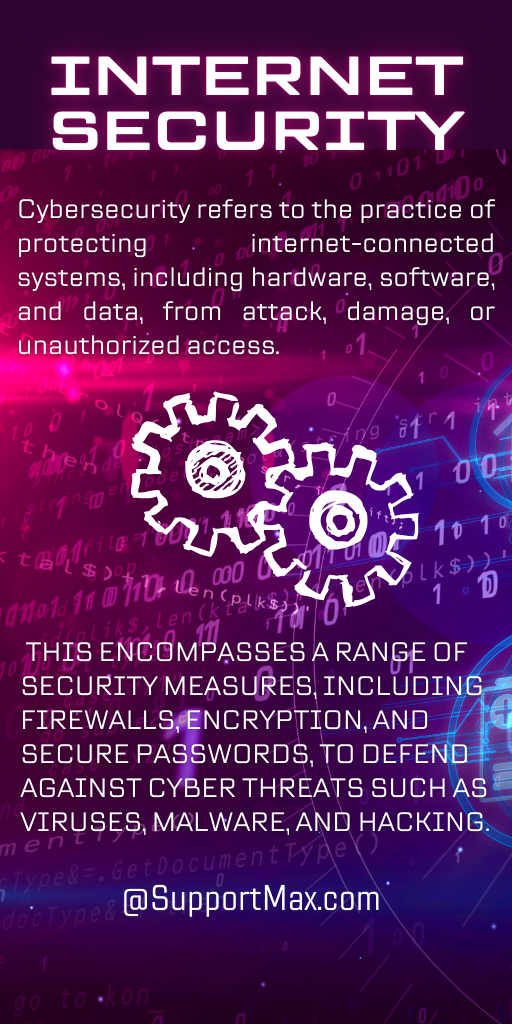
In 2023, cybercrime is predicted to cost the world $8 trillion annually. That’s right—trillion. Now, imagine what could happen to your business if you don’t take cybersecurity seriously. One click on a malicious link, one weak password, and your entire operation could be held hostage. The stakes are high. It’s no longer a matter of if a cyberattack will happen to your organization but when.
Cybersecurity is no longer just the IT department’s concern; it’s a critical issue for everyone, from CEOs to employees, and yes, even customers. Without it, trust vanishes, businesses collapse, and innovation grinds to a halt. We live in a digital-first world, where data is the new oil, and protecting that data has become one of the most important priorities of the modern era.
Stick with me, and we’ll dive deep into why cybersecurity matters more than ever—because protecting your digital assets is non-negotiable in today’s threat landscape.
The Evolving Threat Landscape: Why Cybersecurity Can’t Be Ignored
Cybersecurity is more critical now than ever before because of the evolving nature of cyber threats. Attacks are becoming more sophisticated, and the bad actors behind them are getting smarter. They’re no longer just targeting large corporations; small businesses, individuals, and even critical infrastructure are all in the crosshairs.
Here’s a snapshot of today’s threat landscape:
Ransomware: This is arguably the biggest cybersecurity issue facing businesses right now. Cybercriminals can lock down your systems and demand a ransom to release them. And even if you pay, there’s no guarantee you’ll get your data back.
Phishing Attacks: These attacks have become so refined that even tech-savvy users sometimes fall for them. Cybercriminals use social engineering tactics to trick employees into revealing sensitive information or clicking on malicious links.
Data Breaches: Data breaches are growing in frequency and severity. In 2023 alone, over 422 million individuals were affected by data compromises in the United States. Personal and financial information being leaked can lead to identity theft, financial losses, and long-term reputational damage.
Insider Threats: Not all cyber threats come from outside your organization. Disgruntled employees, or even careless ones, can expose your company to cyberattacks from within.
Cybersecurity can no longer be a reactive measure. Businesses must be proactive, developing robust strategies to defend against these ever-evolving threats. So, how do you go about that? Let’s take a closer look.
Why Cybersecurity is Essential for Businesses of All Sizes
One of the biggest misconceptions about cybersecurity is that it’s only for large enterprises. That couldn’t be further from the truth. In fact, small and medium-sized businesses (SMBs) are often targeted more frequently because attackers know they may not have the same level of protection as a Fortune 500 company.
Here’s why cybersecurity matters for every business:
Financial Impact: Cyberattacks can have devastating financial consequences. From paying ransoms to dealing with downtime, the costs add up fast. In 2022, the average cost of a data breach in the United States was $9.44 million. For smaller businesses, a single breach can be enough to shut down operations.
Reputation Management: Trust is hard to earn but easy to lose. A single data breach can cause customers to lose faith in your brand, leading to lost business and long-term reputational damage. In today’s digital world, a solid cybersecurity foundation is key to maintaining trust with your customers.
Legal and Regulatory Compliance: Many industries, such as healthcare, finance, and retail, are subject to strict data protection regulations like HIPAA, GDPR, and PCI-DSS. Non-compliance can lead to hefty fines and legal consequences, not to mention the loss of customer confidence.
Operational Continuity: Cyberattacks can disrupt your operations, resulting in costly downtime. Whether it’s a ransomware attack locking up your systems or a distributed denial-of-service (DDoS) attack shutting down your website, the impact on your business’s ability to function can be severe.
Actionable Cybersecurity Measures to Protect Your Business
So, what can businesses do to enhance their cybersecurity? The good news is that there are concrete, actionable steps you can take to protect your organization.
Conduct Regular Security Audits: It all starts with knowing where you stand. Conduct regular security audits to identify vulnerabilities in your network, systems, and processes. This should include penetration testing to simulate attacks and find weaknesses before cybercriminals do.
Implement Multi-Factor Authentication (MFA): Passwords alone are no longer sufficient. MFA adds an extra layer of security by requiring users to provide two or more verification factors. This makes it significantly harder for cybercriminals to gain unauthorized access to your systems.
Employee Training: Your employees are often your first line of defense, but they can also be your weakest link if not properly trained. Regular cybersecurity awareness training can help prevent phishing attacks and other common cyber threats.
Keep Software Updated: This sounds basic, but it’s often overlooked. Software vulnerabilities are a prime target for attackers. Make sure all software, including operating systems and applications, are regularly updated with the latest security patches.
Backup Your Data: In the event of a ransomware attack, having recent backups of your data can be a lifesaver. Ensure that your data is backed up regularly and stored in a secure, separate location that is not connected to your primary network.
Use Encryption: Encrypt sensitive data both at rest and in transit. This ensures that even if cybercriminals intercept your data, they won’t be able to read it without the decryption key.
Deploy Endpoint Protection Solutions: Endpoints such as laptops, desktops, and mobile devices are often entry points for cyberattacks. Invest in advanced endpoint protection solutions that can detect and neutralize threats at the device level.
Establish a Cyber Incident Response Plan: No matter how strong your defenses are, breaches can still happen. Having a well-documented incident response plan ensures that you’re prepared to act quickly and minimize the impact if an attack occurs.

Cybersecurity and the Future of Work: A Growing Concern
As more businesses embrace remote and hybrid work models, cybersecurity has become even more important. The rise of cloud computing, collaboration tools, and virtual private networks (VPNs) has blurred the traditional network perimeter, making it harder to secure.
Remote workers often use personal devices and home networks, which are not as secure as corporate systems. This opens up new vulnerabilities that cybercriminals can exploit. As a result, businesses must adapt their cybersecurity strategies to account for this shift in how work is done.
Here are some additional measures to protect your business in the era of remote work:
Encourage VPN Usage: Ensure that remote workers are using secure VPNs to connect to corporate networks. This encrypts their internet traffic and protects sensitive data from being intercepted.
Secure Personal Devices: Implement a bring-your-own-device (BYOD) policy that requires employees to follow certain security protocols, such as installing antivirus software and keeping their devices updated.
Monitor for Unusual Activity: Use tools that monitor for unusual activity on your network. This could include unauthorized access attempts, unusual data transfers, or suspicious login behavior.
Cloud Security: As businesses move more of their operations to the cloud, securing these environments is critical. Ensure that your cloud service provider offers strong security measures, and regularly review and update your cloud security settings.
Conclusion: Why Cybersecurity is Non-Negotiable
Cybersecurity isn’t just important—it’s essential. In today’s digital world, the risks are too high, and the threats too frequent, to ignore. The financial, operational, and reputational costs of a cyberattack can be devastating, especially for smaller businesses that may not have the resources to recover quickly.
By taking proactive steps—such as conducting regular security audits, training employees, and using tools like encryption and MFA—you can significantly reduce your risk and protect your business from the evolving threat landscape.
In short, cybersecurity is everyone’s responsibility. Whether you’re a small business owner, a manager at a large corporation, or an employee working remotely, understanding and implementing cybersecurity best practices is crucial. Because when it comes to protecting your digital assets, you can never be too prepared.


I don’t think the title of your article matches the content lol. Just kidding, mainly because I had some doubts after reading the article.
Some truly nice and useful info on this website, besides I believe the design and style holds superb features.
Your article helped me a lot, is there any more related content? Thanks!
Thanks for sharing. I read many of your blog posts, cool, your blog is very good.
Thanks for sharing. I read many of your blog posts, cool, your blog is very good.
I don’t think the title of your article matches the content lol. Just kidding, mainly because I had some doubts after reading the article.
Thanks for sharing. I read many of your blog posts, cool, your blog is very good. https://accounts.binance.com/ka-GE/register?ref=RQUR4BEO
Thanks for sharing. I read many of your blog posts, cool, your blog is very good.
Thanks for sharing. I read many of your blog posts, cool, your blog is very good. https://accounts.binance.com/pl/register-person?ref=YY80CKRN
I don’t think the title of your article matches the content lol. Just kidding, mainly because I had some doubts after reading the article.
Thank you for your sharing. I am worried that I lack creative ideas. It is your article that makes me full of hope. Thank you. But, I have a question, can you help me?
I really appreciate this post. I have been looking all over for this! Thank goodness I found it on Bing. You have made my day! Thanks again
Your point of view caught my eye and was very interesting. Thanks. I have a question for you.
Can you be more specific about the content of your article? After reading it, I still have some doubts. Hope you can help me.
Your point of view caught my eye and was very interesting. Thanks. I have a question for you.
Can you be more specific about the content of your article? After reading it, I still have some doubts. Hope you can help me.
Thank you for your sharing. I am worried that I lack creative ideas. It is your article that makes me full of hope. Thank you. But, I have a question, can you help me?
Your point of view caught my eye and was very interesting. Thanks. I have a question for you.
Your article helped me a lot, is there any more related content? Thanks!
Your point of view caught my eye and was very interesting. Thanks. I have a question for you.
Your point of view caught my eye and was very interesting. Thanks. I have a question for you.
Can you be more specific about the content of your article? After reading it, I still have some doubts. Hope you can help me.
I don’t think the title of your article matches the content lol. Just kidding, mainly because I had some doubts after reading the article. https://accounts.binance.info/register?ref=P9L9FQKY
I don’t think the title of your article matches the content lol. Just kidding, mainly because I had some doubts after reading the article.
Your point of view caught my eye and was very interesting. Thanks. I have a question for you.
Thanks for sharing. I read many of your blog posts, cool, your blog is very good.
Thanks for sharing. I read many of your blog posts, cool, your blog is very good.
Thank you for your sharing. I am worried that I lack creative ideas. It is your article that makes me full of hope. Thank you. But, I have a question, can you help me?
Thanks for sharing. I read many of your blog posts, cool, your blog is very good.
I don’t think the title of your article matches the content lol. Just kidding, mainly because I had some doubts after reading the article.
Your article helped me a lot, is there any more related content? Thanks!
I don’t think the title of your article matches the content lol. Just kidding, mainly because I had some doubts after reading the article.
Your enticle helped me a lot, is there any more related content? Thanks!
Can you be more specific about the content of your article? After reading it, I still have some doubts. Hope you can help me.
Can you be more specific about the content of your article? After reading it, I still have some doubts. Hope you can help me.
Thank you for your sharing. I am worried that I lack creative ideas. It is your article that makes me full of hope. Thank you. But, I have a question, can you help me?
I don’t think the title of your article matches the content lol. Just kidding, mainly because I had some doubts after reading the article.
Your point of view caught my eye and was very interesting. Thanks. I have a question for you.
Thank you for your sharing. I am worried that I lack creative ideas. It is your article that makes me full of hope. Thank you. But, I have a question, can you help me?
Your point of view caught my eye and was very interesting. Thanks. I have a question for you.
Your point of view caught my eye and was very interesting. Thanks. I have a question for you.
Your article helped me a lot, is there any more related content? Thanks!
Your article helped me a lot, is there any more related content? Thanks! https://www.binance.com/ph/register?ref=B4EPR6J0
Can you be more specific about the content of your article? After reading it, I still have some doubts. Hope you can help me.
I don’t think the title of your article matches the content lol. Just kidding, mainly because I had some doubts after reading the article.
Thanks for sharing. I read many of your blog posts, cool, your blog is very good.
Thank you for your sharing. I am worried that I lack creative ideas. It is your article that makes me full of hope. Thank you. But, I have a question, can you help me?
I don’t think the title of your article matches the content lol. Just kidding, mainly because I had some doubts after reading the article.
Thank you for your sharing. I am worried that I lack creative ideas. It is your article that makes me full of hope. Thank you. But, I have a question, can you help me? https://accounts.binance.com/id/register-person?ref=GJY4VW8W
Thanks for sharing. I read many of your blog posts, cool, your blog is very good.
I don’t think the title of your article matches the content lol. Just kidding, mainly because I had some doubts after reading the article.
Would love to perpetually get updated outstanding website! .
Thank you for your sharing. I am worried that I lack creative ideas. It is your article that makes me full of hope. Thank you. But, I have a question, can you help me?